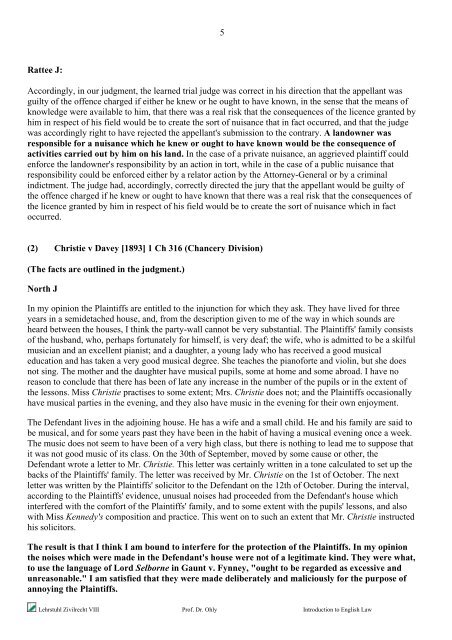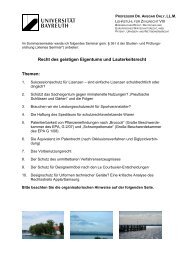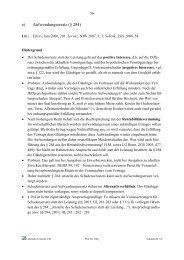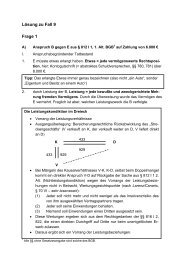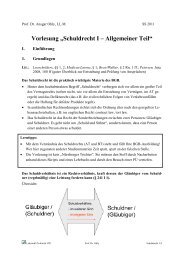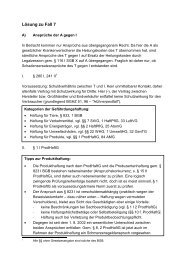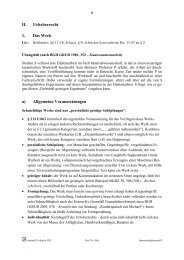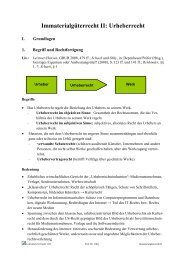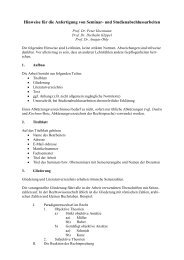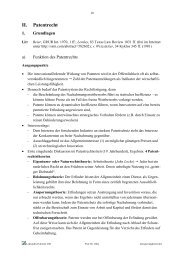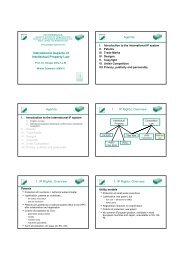3. Wrongful interference with goods, trespass to land, nuisance
3. Wrongful interference with goods, trespass to land, nuisance
3. Wrongful interference with goods, trespass to land, nuisance
You also want an ePaper? Increase the reach of your titles
YUMPU automatically turns print PDFs into web optimized ePapers that Google loves.
5<br />
Rattee J:<br />
Accordingly, in our judgment, the learned trial judge was correct in his direction that the appellant was<br />
guilty of the offence charged if either he knew or he ought <strong>to</strong> have known, in the sense that the means of<br />
knowledge were available <strong>to</strong> him, that there was a real risk that the consequences of the licence granted by<br />
him in respect of his field would be <strong>to</strong> create the sort of <strong>nuisance</strong> that in fact occurred, and that the judge<br />
was accordingly right <strong>to</strong> have rejected the appellant's submission <strong>to</strong> the contrary. A <strong>land</strong>owner was<br />
responsible for a <strong>nuisance</strong> which he knew or ought <strong>to</strong> have known would be the consequence of<br />
activities carried out by him on his <strong>land</strong>. In the case of a private <strong>nuisance</strong>, an aggrieved plaintiff could<br />
enforce the <strong>land</strong>owner's responsibility by an action in <strong>to</strong>rt, while in the case of a public <strong>nuisance</strong> that<br />
responsibility could be enforced either by a rela<strong>to</strong>r action by the At<strong>to</strong>rney-General or by a criminal<br />
indictment. The judge had, accordingly, correctly directed the jury that the appellant would be guilty of<br />
the offence charged if he knew or ought <strong>to</strong> have known that there was a real risk that the consequences of<br />
the licence granted by him in respect of his field would be <strong>to</strong> create the sort of <strong>nuisance</strong> which in fact<br />
occurred.<br />
(2) Christie v Davey [1893] 1 Ch 316 (Chancery Division)<br />
(The facts are outlined in the judgment.)<br />
North J<br />
In my opinion the Plaintiffs are entitled <strong>to</strong> the injunction for which they ask. They have lived for three<br />
years in a semidetached house, and, from the description given <strong>to</strong> me of the way in which sounds are<br />
heard between the houses, I think the party-wall cannot be very substantial. The Plaintiffs' family consists<br />
of the husband, who, perhaps fortunately for himself, is very deaf; the wife, who is admitted <strong>to</strong> be a skilful<br />
musician and an excellent pianist; and a daughter, a young lady who has received a good musical<br />
education and has taken a very good musical degree. She teaches the pianoforte and violin, but she does<br />
not sing. The mother and the daughter have musical pupils, some at home and some abroad. I have no<br />
reason <strong>to</strong> conclude that there has been of late any increase in the number of the pupils or in the extent of<br />
the lessons. Miss Christie practises <strong>to</strong> some extent; Mrs. Christie does not; and the Plaintiffs occasionally<br />
have musical parties in the evening, and they also have music in the evening for their own enjoyment.<br />
The Defendant lives in the adjoining house. He has a wife and a small child. He and his family are said <strong>to</strong><br />
be musical, and for some years past they have been in the habit of having a musical evening once a week.<br />
The music does not seem <strong>to</strong> have been of a very high class, but there is nothing <strong>to</strong> lead me <strong>to</strong> suppose that<br />
it was not good music of its class. On the 30th of September, moved by some cause or other, the<br />
Defendant wrote a letter <strong>to</strong> Mr. Christie. This letter was certainly written in a <strong>to</strong>ne calculated <strong>to</strong> set up the<br />
backs of the Plaintiffs' family. The letter was received by Mr. Christie on the 1st of Oc<strong>to</strong>ber. The next<br />
letter was written by the Plaintiffs' solici<strong>to</strong>r <strong>to</strong> the Defendant on the 12th of Oc<strong>to</strong>ber. During the interval,<br />
according <strong>to</strong> the Plaintiffs' evidence, unusual noises had proceeded from the Defendant's house which<br />
interfered <strong>with</strong> the comfort of the Plaintiffs' family, and <strong>to</strong> some extent <strong>with</strong> the pupils' lessons, and also<br />
<strong>with</strong> Miss Kennedy's composition and practice. This went on <strong>to</strong> such an extent that Mr. Christie instructed<br />
his solici<strong>to</strong>rs.<br />
The result is that I think I am bound <strong>to</strong> interfere for the protection of the Plaintiffs. In my opinion<br />
the noises which were made in the Defendant's house were not of a legitimate kind. They were what,<br />
<strong>to</strong> use the language of Lord Selborne in Gaunt v. Fynney, "ought <strong>to</strong> be regarded as excessive and<br />
unreasonable." I am satisfied that they were made deliberately and maliciously for the purpose of<br />
annoying the Plaintiffs.<br />
Lehrstuhl Zivilrecht VIII Prof. Dr. Ohly Introduction <strong>to</strong> English Law


